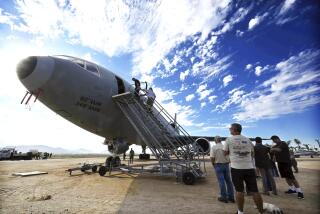Pilots May Not Face Military Trial in Canadians’ Deaths
- Share via
HOUSTON — An Air Force hearing officer on Thursday recommended dropping charges against two U.S. pilots who mistakenly bombed and killed four Canadian soldiers training in Afghanistan last year.
Col. Patrick Rosenow, who presided over a military hearing in January, concluded that there was enough evidence to court-martial both pilots. But he said that administrative sanctions ranging from a letter of reprimand to the loss of pilots’ wings would maintain “the interests of good order and discipline.”
The futures of Majs. Harry Schmidt and William Umbach now rest with Lt. Gen. Bruce Carlson, commander of the 8th Air Force, who will make a final decision. If the Illinois Air National Guard fliers are tried in a military court on charges of involuntary manslaughter and assault, each could face a sentence of up to 64 years in prison.
Schmidt’s mother, Joan Schmidt, said from her home in Missouri that she was relieved. “I am feeling such joy,” she told Associated Press.
The mother of one of the Canadian soldiers killed said she wanted the pilots to be tried. “I want a court-martial, but the charges -- I’m not sure what I want those to be,” said Claire Leger, mother of Sgt. Marc Leger. “I want their wings. That’s the least they can do.”
During an investigative hearing at Barksdale Air Force Base in Louisiana in January, defense lawyers tried to explain why Umbach, 43, and Schmidt, 37, dropped a 500-pound laser-guided bomb on Canadian soldiers training at an abandoned Al Qaeda camp near Kandahar. In addition to the fatalities, eight Canadian soldiers were wounded.
The pilots were returning from a 10-hour routine patrol mission when they spotted tracer bursts below. Believing they were under attack, the pilots radioed their intent to defend themselves. Schmidt, with Umbach’s knowledge, then released the bomb before getting permission from ground control.
Schmidt, a former instructor at a school for fighter pilots, said he was not told that coalition troops might be conducting ground exercises in the area. “This lack of information is the one link in the chain which, if corrected, would surely have avoided this accident,” he said during the military hearing.
Defense lawyers said the pilots were scapegoats for communications breakdowns in the Air Force. They also questioned the military’s practice of prescribing amphetamines, known as “go pills,” to pilots, suggesting that the drugs caused impaired judgment. Both took the stimulant Dexedrine before their mission.
A joint U.S.-Canadian investigation found that the pilots acted recklessly and should be held responsible for their criminal actions. Schmidt used lethal force irresponsibly, said Air Force prosecutors; Umbach, the lead pilot on the mission, failed to stop him. Prosecutors said both men had been briefed about allied troop locations and should have reacted less aggressively after seeing ground fire. Instead of firing back, they said, the pilots could have flown away.
Schmidt and Umbach were the first Air Force pilots to face criminal charges in a so-called friendly fire incident in time of war. Critics have suggested the Air Force caved to political and diplomatic pressure from the Canadian government.
There is no timeline for Carlson to make a final determination on a court-martial, said Capt. Denise Kerr, a public information officer at Barksdale Air Force Base.
Carlson is not bound by Rosenow’s recommendation. The general could order a court-martial, impose administrative sanctions, or dismiss the charges, Kerr said.
More to Read
Sign up for Essential California
The most important California stories and recommendations in your inbox every morning.
You may occasionally receive promotional content from the Los Angeles Times.













